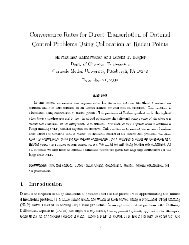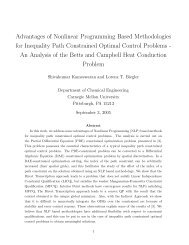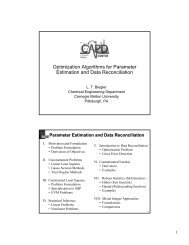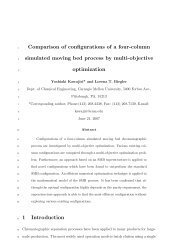MPEC Problem Formulations in Chemical Engineering Applications
MPEC Problem Formulations in Chemical Engineering Applications
MPEC Problem Formulations in Chemical Engineering Applications
Create successful ePaper yourself
Turn your PDF publications into a flip-book with our unique Google optimized e-Paper software.
follow<strong>in</strong>g relaxed problem:m<strong>in</strong>d∇f(w ∗ ) T d (14a)s.t. g(w ∗ ) + ∇g(w ∗ ) T d ≥ 0 (14b)h(w ∗ ) + ∇h(w ∗ ) T d = 0(14c)d x,i = 0, i ∈ I X \ I Y (14d)d y,i = 0, i ∈ I Y \ I X (14e)d x,i ≥ 0, i ∈ I X ∩ I Y (14f)d y,i ≥ 0, i ∈ I X ∩ I Y (14g)Strong stationarity implies no feasible descent direction for (14) and is equivalentto B-stationarity if the biactive set I X ∩ I Y is empty, or if the <strong>MPEC</strong>-LICQproperty holds [1]. <strong>MPEC</strong>-LICQ requires that the follow<strong>in</strong>g set of vectors bel<strong>in</strong>early <strong>in</strong>dependent:{∇g i (w ∗ )|i ∈ I g } ∪ {∇h(w ∗ )} ∪ {∇x i |i ∈ I X } ∪ {∇y i |i ∈ I Y } (15)whereI g = {i : g i (w ∗ ) = 0}.<strong>MPEC</strong>-LICQ implies that the multipliers of (14) are bounded and unique. Ithas been shown that <strong>MPEC</strong>-LICQ is a generic property of MPCCs and of bilevelproblems formulated as MPCC [27] and that this property can be expected tohold “almost everywhere”. That is, if <strong>MPEC</strong>-LICQ is violated for a particular<strong>MPEC</strong>, it can always be satisfied by small perturbations of that problem.Satisfaction of <strong>MPEC</strong>-LICQ leads to the follow<strong>in</strong>g result:Theorem 1 [1, 15, 26] If w ∗ is a solution to the MPCC (3) and <strong>MPEC</strong>-LICQholds at w ∗ , then w ∗ is strongly stationary.With this property, convergence to a strongly stationary po<strong>in</strong>t is much easier(and required for many NLP algorithms), s<strong>in</strong>ce only one set of <strong>MPEC</strong> multipliersis needed to verify optimality and, consequently, this property allows thereformulation of (3) to a number of equivalent nonl<strong>in</strong>ear programs. In the past,special <strong>MPEC</strong> solvers were required [4, 5, 17] to handle these difficulties. Withthis property, <strong>MPEC</strong>s can now be addressed directly through the formulationand direct solution as NLPs. These NLP reformulations are covered <strong>in</strong> the nextsection.F<strong>in</strong>ally, a related (but weaker and implied by <strong>MPEC</strong>-LICQ) constra<strong>in</strong>t qualificationis <strong>MPEC</strong>-MFCQ, which requires that there exist a nonzero vector6






